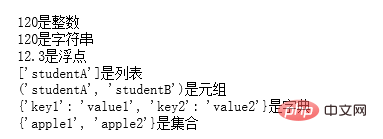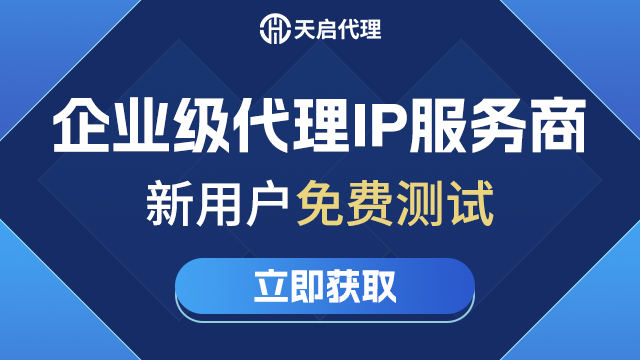
python的数据类型有:数字(int)、浮点(float)、字符串(str),列表(list)、元组(tuple)、字典(dict)、集合(set)。
python学习网,大量的免费python视频教程,欢迎在线学习!
一般通过以下方法进行判断:
1、isinstance(参数1,参数2)
描述:该函数用来判断一个变量(参数1)是否是已知的变量类型(参数2) 类似于type()
参数1:变量
参数2:可以是直接或间接类名、基本类型或者由它们组成的元组。
返回值: 如果对象的类型与参数二的类型(classinfo)相同则返回True,否则返回False。
例子:
#判断变量类型的函数
def typeof(variate):
type=None
if isinstance(variate,int):
type = "int"
elif isinstance(variate,str):
type = "str"
elif isinstance(variate,float):
type = "float"
elif isinstance(variate,list):
type = "list"
elif isinstance(variate,tuple):
type = "tuple"
elif isinstance(variate,dict):
type = "dict"
elif isinstance(variate,set):
type = "set"
return type
# 返回变量类型
def getType(variate):
arr = {"int":"整数","float":"浮点","str":"字符串","list":"列表","tuple":"元组","dict":"字典","set":"集合"}
vartype = typeof(variate)
if not (vartype in arr):
return "未知类型"
return arr[vartype]
#判断变量是否为整数
money=120
print("{0}是{1}".format(money,getType(money)))
#判断变量是否为字符串
money="120"
print("{0}是{1}".format(money,getType(money)))
money=12.3
print("{0}是{1}".format(money,getType(money)))
#判断变量是否为列表
students=['studentA']
print("{0}是{1}".format(students,getType(students)))
#判断变量是否为元组
students=('studentA','studentB')
print("{0}是{1}".format(students,getType(students)))
#判断变量是否为字典
dictory={"key1":"value1","key2":"value2"}
print("{0}是{1}".format(dictory,getType(dictory)))
#判断变量是否为集合
apple={"apple1","apple2"}
print("{0}是{1}".format(apple,getType(apple)))
返回:

2、通过与已知类型的常量进行比较
例子:
#判断变量类型的函数
def typeof(variate):
type1 = ""
if type(variate) == type(1):
type1 = "int"
elif type(variate) == type("str"):
type1 = "str"
elif type(variate) == type(12.3):
type1 = "float"
elif type(variate) == type([1]):
type1 = "list"
elif type(variate) == type(()):
type1 = "tuple"
elif type(variate) == type({"key1":"123"}):
type1 = "dict"
elif type(variate) == type({"key1"}):
type1 = "set"
return type1
#返回变量类型
def getType(variate):
arr = {"int":"整数","float":"浮点","str":"字符串","list":"列表","tuple":"元组","dict":"字典","set":"集合"}
vartype = typeof(variate)
if not (vartype in arr):
return "未知类型"
return arr[vartype]
#判断变量是否为整数
money=120
print("{0}是{1}".format(money,getType(money)))
#判断变量是否为字符串
money="120"
print("{0}是{1}".format(money,getType(money)))
money=12.3
print("{0}是{1}".format(money,getType(money)))
#判断变量是否为列表
students=['studentA']
print("{0}是{1}".format(students,getType(students)))
#判断变量是否为元组
students=('studentA','studentB')
print("{0}是{1}".format(students,getType(students)))
#判断变量是否为字典
dictory={"key1":"value1","key2":"value2"}
print("{0}是{1}".format(dictory,getType(dictory)))
#判断变量是否为集合
apple={"apple1","apple2"}
print("{0}是{1}".format(apple,getType(apple)))
返回:

isinstance() 与 type() 区别:
type() 不会认为子类是一种父类类型,不考虑继承关系。
isinstance() 会认为子类是一种父类类型,考虑继承关系。
如果要判断两个类型是否相同推荐使用 isinstance()。
python学习网,免费的在线学习python平台,欢迎关注!
神龙|纯净稳定代理IP免费测试>>>>>>>>天启|企业级代理IP免费测试>>>>>>>>IPIPGO|全球住宅代理IP免费测试





